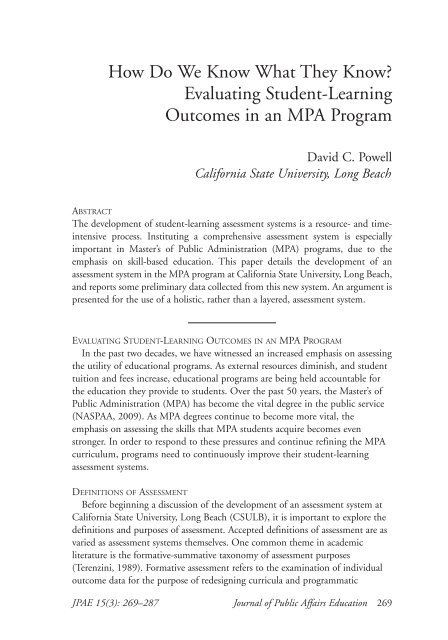JOURNAL OF PUBLIC AFFAIRS EDUCATION - naspaa
JOURNAL OF PUBLIC AFFAIRS EDUCATION - naspaa
JOURNAL OF PUBLIC AFFAIRS EDUCATION - naspaa
You also want an ePaper? Increase the reach of your titles
YUMPU automatically turns print PDFs into web optimized ePapers that Google loves.
How Do We Know What They Know<br />
Evaluating Student-Learning<br />
Outcomes in an MPA Program<br />
David C. Powell<br />
California State University, Long Beach<br />
ABSTRACT<br />
The development of student-learning assessment systems is a resource- and timeintensive<br />
process. Instituting a comprehensive assessment system is especially<br />
important in Master’s of Public Administration (MPA) programs, due to the<br />
emphasis on skill-based education. This paper details the development of an<br />
assessment system in the MPA program at California State University, Long Beach,<br />
and reports some preliminary data collected from this new system. An argument is<br />
presented for the use of a holistic, rather than a layered, assessment system.<br />
EVALUATING STUDENT-LEARNING OUTCOMES IN AN MPA PROGRAM<br />
In the past two decades, we have witnessed an increased emphasis on assessing<br />
the utility of educational programs. As external resources diminish, and student<br />
tuition and fees increase, educational programs are being held accountable for<br />
the education they provide to students. Over the past 50 years, the Master’s of<br />
Public Administration (MPA) has become the vital degree in the public service<br />
(NASPAA, 2009). As MPA degrees continue to become more vital, the<br />
emphasis on assessing the skills that MPA students acquire becomes even<br />
stronger. In order to respond to these pressures and continue refining the MPA<br />
curriculum, programs need to continuously improve their student-learning<br />
assessment systems.<br />
DEFINITIONS <strong>OF</strong> ASSESSMENT<br />
Before beginning a discussion of the development of an assessment system at<br />
California State University, Long Beach (CSULB), it is important to explore the<br />
definitions and purposes of assessment. Accepted definitions of assessment are as<br />
varied as assessment systems themselves. One common theme in academic<br />
literature is the formative-summative taxonomy of assessment purposes<br />
(Terenzini, 1989). Formative assessment refers to the examination of individual<br />
outcome data for the purpose of redesigning curricula and programmatic<br />
JPAE 15(3): 269–287 Journal of Public Affairs Education 269
















